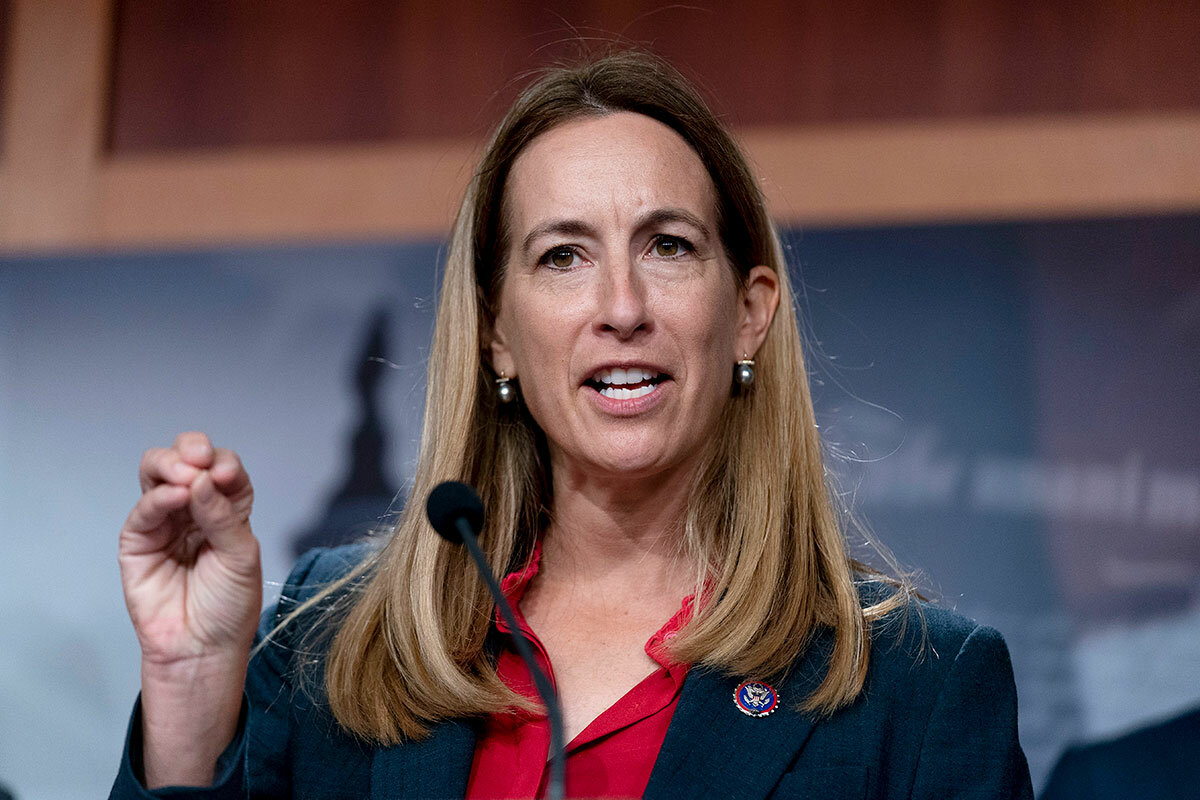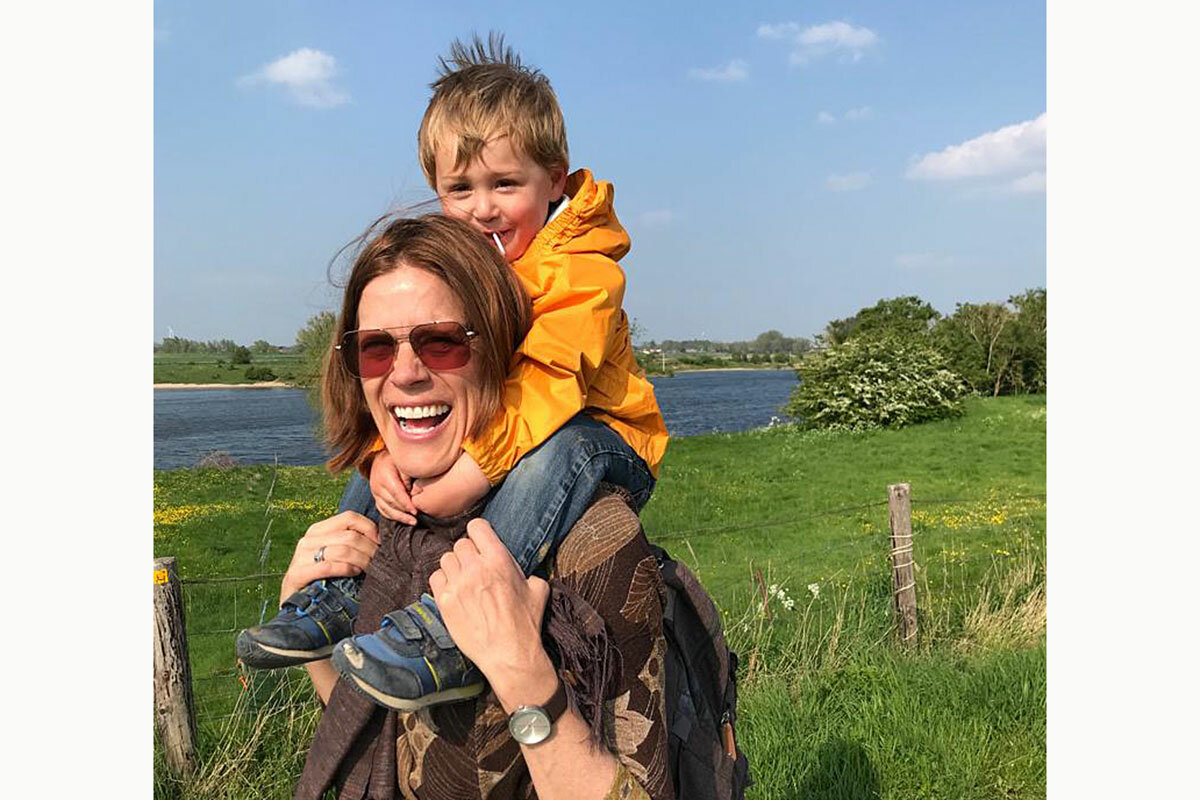Congress acts on guns, with military vets among the vocal backers
Loading...
As a Marine Corps veteran with a Facebook account, Carl Forsling saw friends of friends posting in the days after the Uvalde school shooting in Texas about how to prevent such future tragedies.
The gist was, “Arm veterans, put them in schools, problem solved,” he says – a solution endorsed by Sen. Lindsey Graham, among other policymakers. “It’s the idea of, ‘This is a hard problem – let’s have military veterans do it.’”
Mr. Forsling, who served as a company commander in Afghanistan, decided to write a piece pointing out some flaws he saw in the “good guy with a gun” proposals. Among them: that very few veterans have the sort of training in high-stress, close-quarters shooting situations that allows them to be an asset on the scene.
Why We Wrote This
Members of the U.S. military in some ways trend conservative. Yet they share wider public concerns about gun safety – often supporting restrictions on military-style firearms.
“It’s not like riding a bike,” he notes. Experts train for a living. “There’s a reason why special operations forces are held in such high regard.”
Upon the piece’s publication, Mr. Forsling garnered plaudits from fellow veterans but pushback from the people who love them, including responses along the lines of, “You’re wrong – veterans can do anything!” and “My cousin Kevin was in the Navy. He doesn’t have a job and would love to do this,” he recalls.
In the heated debate over guns in America, U.S. veterans are increasingly weighing in to provide reality checks on policy proposals and endeavoring to encourage cooperation and forge compromise in what is – it’s widely agreed across the political aisle – a critical quest for the safety of vulnerable schoolchildren.
In many cases, their efforts represent a change in tack to get laws enacted, even if they fall short of the bans on certain weapons many would like to see, says Jason Dempsey, who served as an infantry officer in Iraq and Afghanistan.
“When you have something that’s been argued again and again for 20 to 30 years, it’s hard to break new ground. But accepting the status quo is just unfathomable,” he says.
“What we’re trying to get at is that if we’re going to be fetishizing these military-grade weapons, then at least we can push for training, safety, and accountability,” adds Dr. Dempsey, who has a Ph.D. in political science and serves on the Everytown for Gun Safety Veterans Advisory Council.
Such efforts at compromise, from vets and others, paid off this week as Congress passed its first major gun safety legislation in a quarter century – with a Senate vote Thursday followed by House action Friday to set up an expected signature by President Joe Biden. The bill tightens up registrations for firearms dealers, makes it easier to remove guns from people convicted of domestic violence, and enhances background checks for gun buyers between ages 18 and 21 (the Uvalde shooter legally bought his assault rifle the day after he turned 18).
“If you don’t rent a car to someone under 25, because you don’t trust them, or if we don’t trust you with a beer, we probably shouldn’t trust you with some of these weapons,” Dr. Dempsey says. “Some gun manufacturers are selling the idea that we can have unfettered freedom without responsibility – but you can’t have one without the other.”
Combat experience pivotal
When Christopher Ellison, professor of sociology at the University of Texas at San Antonio, began researching the opinions of veterans on gun control, he and his colleagues were surprised how little social science there was on the topic.
“We thought, my goodness, surely somebody’s looked at this before – how combat experience and other types of military socialization may play into gun policy attitudes.”
They had not, though many have assumptions about what veterans think of gun laws – particularly given that they’re more likely to own firearms than the general population, and given the trend toward political conservatism in the ranks since the end of conscription, Dr. Ellison notes.
Such factors might suggest that military service members would be more opposed to gun control than the average U.S. citizen.
“What we found was much more nuanced,” he says.
While veterans are more likely to be supportive than nonvets of expanding civilians’ gun carrying rights – including supporting open carry laws – veterans with combat experience are 78% more likely than nonvets to favor banning AR-15s and other military-style rifles and high-capacity ammunition clips, Dr. Ellison and his colleagues concluded in their subsequent study, which was published in April in Social Science Quarterly.
They are also more likely to favor a 14-day waiting period for all gun purchases.
The opinions of military veterans without combat experience, by contrast, “were not all that different from the general population,” he notes. “I think a lot of people might have suspected that particularly combat veterans would be all gung-ho and say ‘less gun control.’”
Much of this has to do with the “demystification” of firearms that comes from combat experience, in which they are seen as a tool, rather than as an object of empowerment, Dr. Ellison and his colleagues hypothesize.
“These are people who know the most about the capacity of these firearms – and the damage they can do.”
Family safety first
As a mother and a military veteran who was a pistol instructor and captain of the crew team at the U.S. Naval Academy – later serving as a pilot – Sarah Dachos had plenty of experience with weapons.
“I had these quote-unquote credentials. I roll my eyes as I say that, but this is what people think.”
But ultimately gun violence in America convinced her to settle in the Netherlands with her Dutch husband and their two young children.
It was a wrenching decision that left her feeling like she was “abandoning” Washington, D.C. Yet it was about the safety of her family. She was seeing an increase in gun violence, and then there was a shooting incident two blocks from her home along the route where she walked her child to school.
Having lived in America for eight years, Ms. Dachos’ husband “had constantly asked me how it was possible to have such levels of gun violence in one of the most industrialized, democratized, and wealthiest countries on the planet.”
Ms. Dachos saw a connection between racism and violence, and led volunteer efforts with Moms Demand Action, a gun safety nonprofit. “We’d set up tables at conferences to talk about ‘How do you keep your gun safe? How do you talk to people who have guns when there’s a play date?’”
She found the foot traffic encouraging. “Everybody wants to be safe with their guns. Most people don’t want to kill people with their guns. So that’s a great way to engage,” she says. “It’s, ‘We’re not trying to take away your guns.’”
But after moving to the Netherlands with their two young children, where they were close to grandparents and where their children could attend schools during the closures due to the pandemic, Ms. Dachos and her husband got used to feeling safe.
“The big advantage here is that the kids are not doing shooter drills or experiencing live shooters in their schools,” she says. “At one point my husband and I looked at each other and said, ‘It’s not worth it to us to run the risk that our children will be victims of gun violence.’”
Today, when not working for a composting business, Ms. Dachos continues to write grant proposals for the TraRon Center in Washington, a nonprofit that helps children affected by gun violence work through their grief.
Ms. Dachos has been impressed by the legislative efforts of Sen. Chris Murphy and her former crew teammate from the Naval Academy, Rep. Mikie Sherrill, who have worked on compromise gun control bills, and by efforts in 19 states to enact red flag laws to prevent people who show signs of being a threat to themselves or others from buying guns.
“There’s not a lot of new stuff to come up with” when it comes to gun control legislation, Ms. Dachos says. “But maybe the fresh thinking is in ‘How do we continue to engage with those who don’t agree with us?’”
Editor's note: This article has been updated to clarify that Sarah Dachos now has a job in composting, and to more accurately describe the risk of violence she observed in her neighborhood in the U.S.








